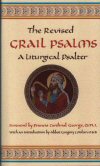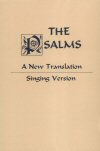The Grail Psalms (2 vols.)
Digital Logos Edition
This product is only available in the US, US Territories, and Canada.
Overview
The Hebrew psalms were originally written to be sung, not just as static poems on paper. For thousands of years, the Church has had a rich musical prayer life, integrating psalm singing with liturgical prayer. The Grail Psalms are the Catholic Church’s singing translation of the Hebrew psalms. Every syllable in the translation was considered during the translation process, giving a translation that is faithful to the original rhythm of the psalms and musical direction with tones, beats, stresses, and notes considered throughout. All 150 psalms are thus translated and arranged according to Catholic liturgical use, especially with the Liturgy of the Hours in mind.
- Fully searchable and indexed by verse
- Accessible on your desktop, laptop, and mobile device
- Title: The Grail Psalms
- Publisher: GIA Publications
- Volumes: 2
- Pages: 608

This new translation brings the Grail Psalms in line with contemporary principles of Scripture scholarship, matters of authentic translation, and requirements for appropriate rendering for liturgical use. This translation of the psalms meets the requirements established in Liturgiam Authenticam (the 2001 Instruction issued by the Congregation for Divine Worship and the Discipline of the Sacraments enunciating principles for preparing translations of liturgical texts). This revision of the 1963 Grail Psalms has been prepared by the monks of Conception Abbey under the direction of Abbot Gregory J. Polan, OSB, producing a translation that will play an important part in the liturgy for years to come.
The Psalms are a most treasured prayer book of the Church. They are the foundation stones of both Jewish and Christian liturgy. As the inspired word of God, the Psalms hold a privileged place among all forms of prayer, public and private. Indeed, the Psalter is a true grammar that teaches us the language of prayer that draws us into communion with God. In praying the Psalms, we speak to God with the very words God has spoken to us. The new Grail translation of these most valued prayers now opens us in a fresh way to the poetic beauty and rich theology of these inspired words. Faithful to the Hebrew text, the Revised Grail Psalms capture the thoughts, the imagery, and the human emotions of each psalm.
—Most Rev. Arthur J. Serratelli, bishop, Patterson, New Jersey

In the mid-1950s—a time when the movement toward liturgical reform that began in the early twentieth century had gained significant momentum—the Ladies of the Grail (England), a lay women’s community, gathered a group of scholars to prepare a new translation of the psalms. First published in 1963, the Grail Psalms were approved for liturgical use and adopted for the English editions of the Liturgy of the Hours following the Second Vatican Council. The unique character of the Grail Psalms is that they incorporate the rhythm of the original Hebrew text and are singable to the psalmody of the late French Jesuit priest and composer Joseph Gelineau. The combination of this text and the Gelineau music came to be widely known as the “Gelineau Psalms.” These are the psalms still sung in the Liturgy of the Hours today.
Notes on each psalm are provided by Fr. Alexander Jones (editor of the Jerusalem Bible) and Fr. Leonard Johnston.